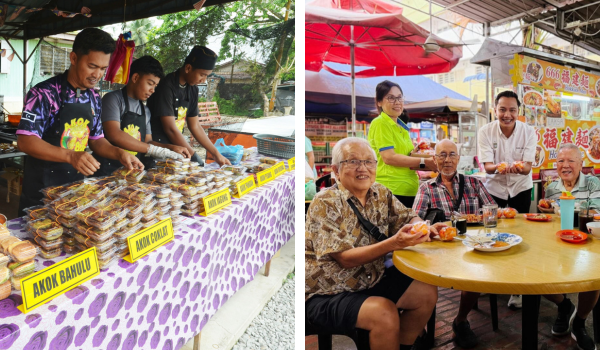
The Thirteenth Malaysia Plan (RMK13), tabled by the Prime Minister on 31 July 2025 in Parliament, signals a significant turning point in Malaysia’s development planning—particularly in addressing the realities of a rapidly ageing society. As the final national development plan before 2030, RMK13 aligns with the Sustainable Development Goals (SDGs) and the United Nations Decade of Healthy Ageing (2021–2030), providing a strong foundation for inclusive, sustainable, and future-ready policy implementation.
The Malaysian Research Institute on Ageing (MyAgeing®) at Universiti Putra Malaysia commends the Government’s foresight in highlighting demographic change as a major national megatrend. By recognizing both the opportunities and the complexities of an ageing population, RMK13 introduces significant structural reforms that will shape the nation’s preparedness for this demographic transition.
National Ageing Blueprint: A Strategic Step Forward
One of the landmark features of RMK13 is the introduction of the National Ageing Blueprint (NAB), which adopts a life-course approach to ageing. This blueprint is a strategic policy direction aimed at guiding Malaysia through its transformation into an aged nation. While NAB has been presented at the National Economic Action Council (MTEN) and discussed during RMK13 development workshops, MyAgeing® encourages the Government to finalise and publicly release the document to facilitate broader stakeholder engagement and implementation.
Interestingly, RMK13 also replaces the long-used term “warga emas” with “warga berusia” when referring to older persons, reflecting a shift towards more inclusive and respectful terminology. However, it is the comprehensive and systemic approach to ageing policy—rather than just terminology—that sets RMK13 apart.
Two Core Reforms: Long-Term Care and Social Protection
For the first time in Malaysian development planning history, long-term care (LTC) is recognised as a national strategy (Strategy D2.1). RMK13 proposes a sustainable LTC ecosystem governed by a central authority to oversee childcare, disability care, eldercare, and faith-based institutions. This reflects an integrated care framework that spans all age groups and support needs.
The World Health Organization (WHO) defines LTC as encompassing “personal, social, and medical services” to help individuals with or at risk of reduced capacity to maintain dignity and independence. MyAgeing® fully supports this broad view and emphasises the importance of collaborative regulation involving the Government, private sector, and civil society.
The plan highlights both institutional and community-based LTC models, focusing on quality assurance, professional training, and equitable access. The recognition of LTC as a driver of economic growth also opens up opportunities in gerontechnology, retirement migration, senior living services, and job creation in what is now being termed the purple economy. These developments are aligned with Malaysia’s ongoing efforts to increase female labour force participation by redistributing care responsibilities.
Complementing this is Strategy D2.3, which outlines major social protection reforms. The introduction of a hybrid Employees Provident Fund (EPF) payout system—offering both lump sum and monthly pensions—is a bold move to enhance income security in later life. While the plan does not yet detail contribution caps or risk-pooling mechanisms, it signals strong political will for meaningful pension reform.
Sustainability of the civil service pension scheme is also addressed (Strategy C3.4), encouraging a holistic view across major pension institutions including KWAP, PERKESO, EPF, and LTAT. In addition to occupational pension reforms, attention must also be given to voluntary retirement savings and the expansion of social assistance into basic pension coverage for vulnerable seniors.
Promoting Productive Ageing Through Employment
RMK13 advances beyond the traditional retirement age debate by focusing on employment reform, flexible work arrangements, and reskilling via Technical and Vocational Education and Training (TVET) and lifelong learning initiatives. MyAgeing® applauds the plan’s aim to increase labour force participation among older adults aged 60 and above and recommends prioritising re-employment schemes as a phased retirement strategy—both fiscally sustainable and socially empowering.
A Whole-of-Society, Whole-of-Government Approach
RMK13 recognises ageing as a cross-cutting issue, with relevant strategies appearing in various areas including housing (e.g., long-term lease for seniors), adult learning (e.g., University of the Third Age), poverty alleviation, LTC and health insurance, filial responsibility, and social innovation. These measures reflect a whole-of-society and whole-of-government approach that resonates with both the Madrid International Plan of Action on Ageing (MIPAA) and the International Conference on Population and Development (ICPD).
MyAgeing® is particularly encouraged by the positive role of cash transfer schemes like Sumbangan Tunai Rahmah (STR) and Sumbangan Asas Rahmah (SARA), which support family-based care. Additionally, advancements in AI and the development of a national household registry system can enhance aid delivery and facilitate future policies such as a Negative Income Tax system or common targeting mechanisms.
Towards a Society for All Ages
As Malaysia navigates its demographic transition, RMK13 offers a historic opportunity to reimagine the nation as one that embraces ageing with dignity, inclusivity, and sustainability. MyAgeing® stands ready to support the implementation of RMK13 through its multidisciplinary research, policy consultation, and capacity-building initiatives.
This is the author’s personal view and does not necessarily represent the views or official position of RTM.

Associate Professor Dr. Rahimah Ibrahim
Director, Malaysian Research Institute on Ageing (MyAgeing®)
Universiti Putra Malaysia
Email: imahibrahim@upm.edu.my


